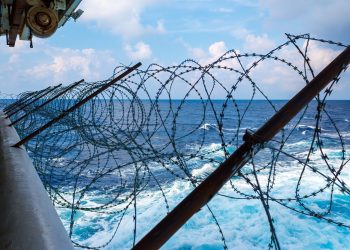Following official consultations, South Africa’s Department of Transport has announced relaxation of some of the strict restrictions on maritime sector activities brought in response to the COVID-19 pandemic, particularly around the country’s ports.
In a new Marine Notice issued in Ptetoria on Tuesday, SAMSA announced the revised measures, which aim at alleviating pressure on particularly trade goods movement and handling, as well as personnel such as ships crews.
In particular, the Marine Notice addresses such issues as crew changes at the country’s commercial ports, revised regulations on the management of cargo vessels, as well as the loading and off loading of cargo, all of which faced tough measures before, some of which included an outright ban.
On 23 March 2020, the President of South Africa declared a lockdown for a period of 21 days, effective from 27 March 2020, to stop the spread of the COVID-19.
Following the revision of the tough restrictions, SAMSA confirmed the following are now effective:
- All South African ports remain open for port operations
- Cargo operations will continue in all ports
- Stevedore operations will continue in all ports and
- All types of cargo will be allowed to be loaded and off loaded (and not just essential cargo).
The Department of Transport recognises that there have been numerous instructions distributed by various entities, causing confusion amongst various entities, service providers and shipping companies,
…SAMSA explained.
South African ports
All South African Commercial Ports will remain operational for Cargo Work. These are Cape Town, Saldanha, Mossel Bay, Port Elizabeth, Port of Ngqura, East London, Durban, and Richards Bay.
Cargo operations
Government has now decided that in the interest of ensuring a functional supply chain across all ports, that all cargoes will be accepted for loading and off-loading. Where possible, essential goods should receive preferential treatment over non-essential goods.
Transnet’s current priorities, in addition to all the essential services previously communicated, are:
- The integrated container logistics system mainly around the Port of Durban and the link to the economic hub in Gauteng – ensuring that the complex system remains efficient to enable the movement of priority and essential containerized goods; this includes the movement of non-essential cargo to City Deep, only for purposes of decongesting the Port of Durban, .
- The heavy haul rail and ports export system from the Northern Cape to the Port of Saldanha; and .
- The domestic and export Coal and other GFB cargo through the Port of Richards Bay.
All other specific approvals granted by Government, which are dependent on the rest of the South African rail and ports system will be considered on a case by case basis.
Stevedoring
The provision of Transnet’s service is subject to customers and their cargo handlers/siding operators taking necessary measures to protect Transnet staff who interface with their operations.
This therefore means strict adherence to health and safety protocols will not be compromised. Customers must provide Transnet with the Business Continuity Plans (BCP) and update Transnet daily on the status of their employees.





























































